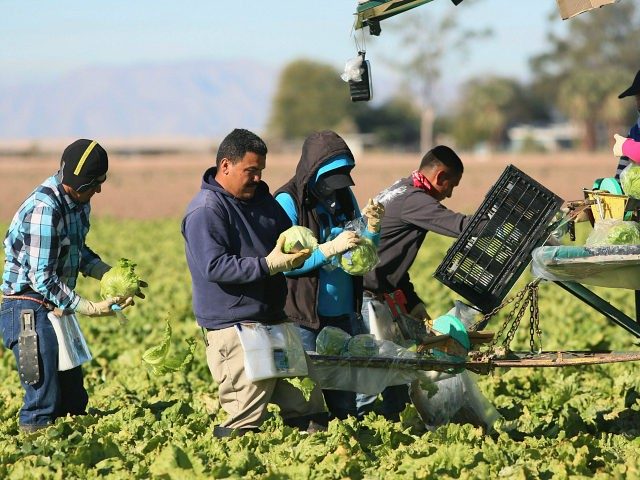The often crammed working and living conditions that imported foreign farmworkers are exposed to pose a particular public health risk during the Chinese coronavirus crisis, experts say.
While jobless claims for Americans have spiked beyond 6.6 million in just a week, the State Department announced new visa waivers for H-2A and H-2B foreign agricultural and nonagricultural workers, making it all the easier for businesses to import cheap foreign labor.
For H-2A foreign visa workers — the program by which big agriculture imports hundreds of thousands of farmworkers every year — working and living conditions are tight, an issue amid mandatory social distancing standards issued by the Center for Disease Control (CDC).
Labor laws demand that employers of H-2A foreign visa workers provide their imported workforce with housing, which often means nationals from across Central America live in close living quarters together.
Experts with the Economic Policy Institute (EPI) note in new research that H-2A foreign farmworkers will be at risk of contracting and spreading the coronavirus due to these close working and living conditions should employers not change their practices.
“The most important thing farm employers should do now is devise safety plans and procedures and procure additional safety and sanitation equipment,” EPI researchers Daniel Costa and Philip Martin write. “In order to keep healthy, farmworkers need access to masks, gloves, and other safety equipment, as well as ways to disinfect their hands, tools, clothing, and machinery.”
EPI researchers continue:
Employers may need to implement “social distancing” measures in fields and packing facilities to minimize the risk of farmworkers infecting one another. This will require changes in workplace habits that may be uncomfortable for workers and may reduce productivity if, for example, crews that work conveyor belts in vegetable fields are shrunk to avoid close contact. [Emphasis added]
Employers should encourage farmworkers to report when they feel ill and to stay home if they are sick, and not punish them for it. If workers think they will be disciplined, have their hours cut, or be fired, they may work sick, endangering their colleagues. Some Mexican exporters are reportedly checking the temperatures of their workers and barring visitors, fearing that a COVID-19 case could prevent them from exporting produce to the United States. [Emphasis added]
Left-wing organizations representing foreign farmworkers have told the media that they have serious reservations about the working and living conditions in the midst of much-needed social distancing measures to stop the spread of the coronavirus.
These spokespersons also said big agriculture’s push to pack farms with as many H-2A foreign visa workers this year amid the crisis could mean more working and living condition violations.
“We’re really concerned, especially given that a lot of them live in bunker-style housing,” a spokesperson with the left-wing Central Coast Alliance United for a Sustainable Economy group told the Santa Maria Sun.
“We are really concerned that in this emergency situation we’re going to … see an increase in housing violations by overcrowding,” another spokesperson with a left-wing advocacy group said. “There are not going to be adequate measures taken to ensure that workers can social distance, either at the housing or in the surrounding areas.”
While H-2A foreign visa workers earn well above the $7.25 an hour federal minimum wage, farmers routinely use the program to reduce wages in the agricultural industry, the Bureau of Labor Statistics data has shown.
In 2017, H-2A foreign visa workers picking crops were paid about two percent less than their American counterparts, while visa workers operating agricultural equipment were paid 23 percent less than the national average wage for that job. The largest wage discrepancy comes with H-2A foreign visa workers who take jobs as first-line supervisors for farming and fishing. They are paid about 95 percent less than their American counterparts.
John Binder is a reporter for Breitbart News. Follow him on Twitter at @JxhnBinder.

COMMENTS
Please let us know if you're having issues with commenting.